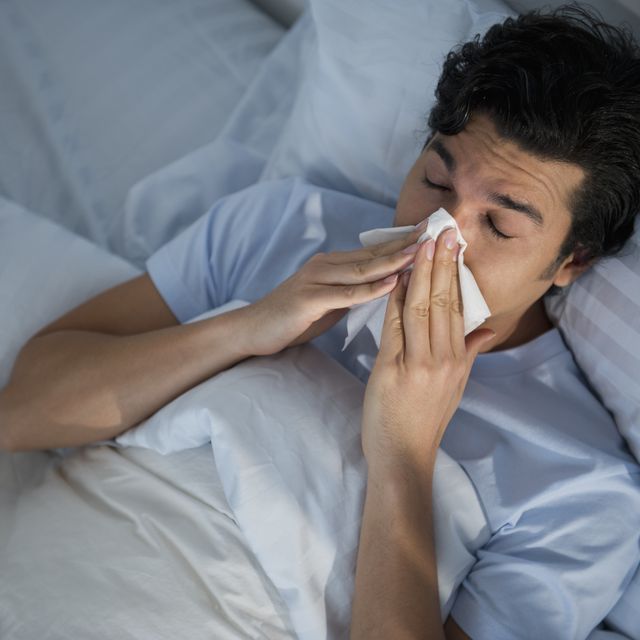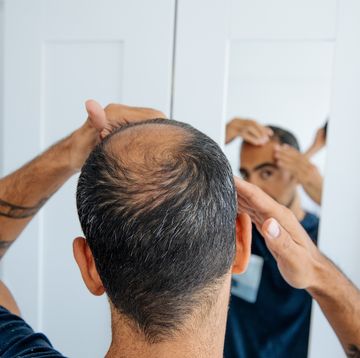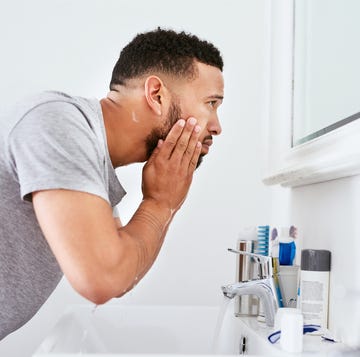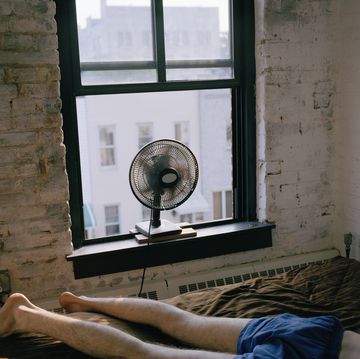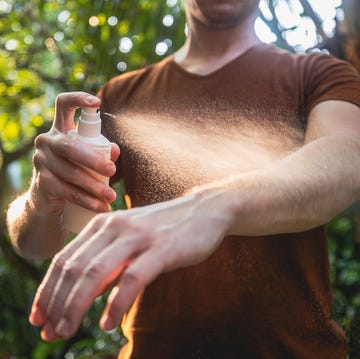Finally, after a long day of battling a stuffy nose—from a cold, a virus, or allergies—you get to go to bed. And your blocked nose gets worse.
There’s a reason for that—and there are also some good ways to get stuffiness out of your nose at night.
Why your nose gets stuffed up at night
When it comes to your nose and mucus, gravity is your friend. When you’re up and about during the day, even if you have a cold, mucus is draining down and out of your nose.
But when you get into bed, you don’t have the gravity advantage. “When you’re in the supine position, congestion gets stuck,” explains Lakiea Wright, M.D., an allergist at Brigham and Women’s Hospital. What makes it even worse, she says, is that when you have allergies or a cold, inflammatory chemicals that go to help fight the microbes or irritants in your nose get stuck there, too. “It’s like a traffic jam,” she says.
To clear it up so you can breathe easily again, it helps to know if what’s causing the stuffiness is allergies or a cold (here’s how to figure it out). Then, you can take the right steps and the right medicines for the job. There’s no sense in bringing out a sledgehammer if what you really need is a belt sander, so to speak.
If your nighttime stuffiness is from allergies
If you have allergies, nighttime can be especially tricky for your nose. “At night, your mast cells can be very active and can start firing off histamine at night,” says Dr. Wright. That’s an attempt by your body to help you get rid of an allergen. But it they can also contribute to mucus and contribute to the traffic jam that’s already happening.
Take care of your allergies, of course, and your nose shouldn’t be as blocked at night. The first step, of course, is to contact a doctor and figure out exactly what you’re allergic to. Then you can:
- Control your exposure to that allergen as much as possible. So if it’s certain kinds of pollen, you’d want to keep your windows shut when it’s everywhere, and make sure you shower and change when you come in from the outdoors when those trees, flowers, and grasses are in full bloom. “You want to do as much as you can to remediate your environment,” says Dr. Wright.
- Consider OTC medications. By controlling the allergy with OTC allergy medications (see the best ones here), you may be able to eliminate nighttime stuffiness. You may need an antihistamine medication (you probably know them by names including Claritin, Zyrtec, and Allegra), or you may want a nasal steroid (that’s Flonase, or Nasacort). Just be aware that the nasal steroids can take a few days or a week for you to notice that they’re working. Some people may end up on both medications, says Dr. Wright.
If your nighttime stuffiness is from colds or the flu
When you’re sick, the blood vessels in your nose open up more than usual, and decongestants constrict them, explains Crystal Zhou, PharmD, assistant professor in the department of Clinical Pharmacy at UCSF School of Pharmacy.
The trouble is, she explains, “these medications are not specific to the nasal passageways. They have the ability to decrease the size of blood vessels all over the body, and that can cause high blood pressure.” So decongestants can be risky if you have underlying cardiovascular disease. So it makes sense to try to start taming a blocked nose at night in a non-systemic way first.
No-pill nasal relief methods
- Elevate your head. Even propping yourself up on a few extra pillows can make a difference.
- Hydrate. “Patients ask me ‘if I have extra fluid in my nose, why should I drink more water?’ But the fluid in your passageways is in the form of mucus, and if you can think it by drinking more water, it will help clear it,” Zhou says.
- Try saline nasal sprays. Saline sprays, like Ocean nasal spray, have anti-inflammatory properties. Squirt them in your nose a few times a day and before bed, and some of that congestion may go away. “It works really well for some people,” says Zhou. But not others.
- Consider a nasal rinse. That means a neti pot or a saline nasal rinse that comes in a squeeze bottle. Whereas a spray like Ocean is very localized, says Zhou, “saline nasal rinses help clear the entire nasal passageway.” Also, she explains, “the sodium is a little more concentrated than it is in your tissues, so it can draw out more of the fluid.” Meaning, the stuff that’s making you so miserable.
If you want a decongestant
If you don’t have underlying health concerns that prevent you from taking a decongestant, here’s how to stop feeling so dazed in the cold remedies aisle.
Know that there are two types of OTC decongestants, both of which constrict blood vessels, says Zhou.
Pseudoephedrine is OTC, but pharmacists have to keep it behind the counter and note its purchase (large quantities can be used to make crystal meth). “It not only constricts blood vessels, it also somewhat works on the lungs to help open those. It has two mechanisms of action that help you breathe better,” she says.
Phenylephrine, the other main type of decongestant that you can just pluck off the shelf, doesn’t have that lung action.
The trouble with these at night is that they’re stimulants. So for “PM” or “nighttime” formulations, drug companies add something to the meds that help you sleep. If you don’t like or need those sedating additions, there’s a hack you can try with daytime meds, says Zhou. Try taking a 12-hour formulation about 11 or 12 hours before you want to sleep. It may keep your nose from being blocked long enough to get you to sleep, and hopefully a stuffy nose won’t awaken you in the middle of the night.
What about combination products? Those cold meds with something for cough, headache, and congestion? “I like combination products if you truly need every ingredient in there,” says Zhou. But in general, when it comes to cold medications, more isn’t better. Get just the ingredients you need to breathe easier.
